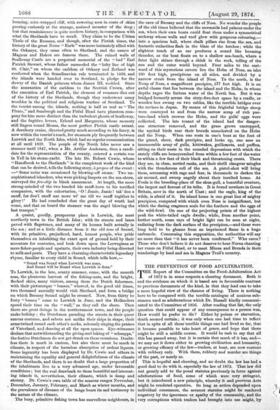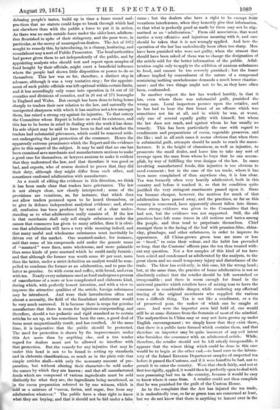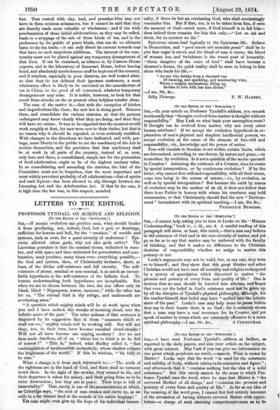THE PREVENTION OF FOOD ADULTERATION.
THE Report of the Committee on the Food-Adulteration Act of 1872 is in some respects a cheering document. Both it and the evidence on which it is based are in favourable contrast to previous documents of the kind, in that they lead one to take a more hopeful view of the chances of living. There is nothing here to be compared with the terrible catalogue of noxious sub- stances used as adulterations which Dr. Hannah kindly communi- cated to the Committee of 1856. After reading that list, the only question that could appear of any consequence to a person was, How would he prefer to die? Either by poison or starvation, death seemed certain ; it was only when one had time to reflect that in spite of all these-terrible things one had lived so far, that it became possible to take heart of grace, and hope that there might be still a middle course. It would be rash to say that all this has passed away, but it is certain that much of it has, and— we may set it down either to growing civilisation and humanity, or growing efficacy of the law—traders, at least, are now content with robbery only. With them, robbery and murder are things of the past, or nearly so.
This is hopeful and cheering, and no doubt the law has had a good deal to do with it, especially the law of 1872. That law did not greatly add to the penal statutes previously in force against adulterations of food, some of which were very stringent, but it introduced a new principle, whereby it and previous Acts might be rendered operative. So long as action depended upon individual consumers, the severest statutes might be rendered nugatory by the ignorance or apathy of the community, and the very corruptions which traders had brought into use might, by than some kinds of pure mustard which he could easily furnish ; out any question. Not a few samples of this kind of tea have and that although the former was worth some 40 per cent. more been seized and condemned as adulterated by the analysts, to the than the latter, under a strict definition an analyst would be com- great alarm and no small temporary injury and disturbance of the pelled to condemn the former as an adulteration, and to pass the trade. The blow has evidently, in this case, hit the wrong head ; latter as genuine. So with cocoa and coffee, with bread, and even but, at the same time, the practice of home adulteration is not so with tea. Nearly every substance used as food undergoes a process absolutely extinct that the retailer should be left unwatched or of manufacture of a more or less eomplicated and elaborate kind, irresponsible ; and there is room enough for fraud in the during which, with perfectly honest intention, and with a view to universal practice which retailers have of mixing teas to leave the improve the attractive qualities of the article, foreign substances consumer in considerable danger, while rendering any effectual may be introduced. And were their introduction often not tracing of the original merchants who supplied the various almost a necessity, the field of the fraudulent adulterator would teas a difficult thing. Tea is not like a condiment, or a tin be very much narrowed. It is because there is scope for genuine of preserved peas, the maker of which can be caught at manufacture that there is room for injurious compounding, and once. And were the importer even laid hold of, one would therefore, should a too pedantic and rigid standard as to certain still be at some distance from the fountain of most of the mischief.
articles be set up, as has sometimes been the case, a good deal of The malpractices in,China may or may not have grown up under harm must unquestionably result, and has resulted, At the same English encouragement ; we simply know that they exist there, time, it is imperative that the public should be protected. that there is a public taste formed which sustains them, and that The need for protection is shown by the improvements under therefore an importer may be quite innocent of any evil intent
this Act more than by anything else, and a too tender who furnishes the consumer with an adulterated article. While, regard for dealers must not be allowed to interfere with therefore, the retailer should not be left utterly irresponsible, it
that protection. But the remedy for any injustice that may lie appears that the wisest thing which could be done in this case under this head is not to be found in setting up standards would be to begin at the other end,—to hand over to the labors- and in elaborate classifications, so much as in the plain rule that tory of the Inland Revenue Department samples of suspected tea simple articles shall—with only the necessary amount of pre- before it passed the Customs, and if it were founti to be bad, not to paration, but without altering their character—be sold under permit it to enter the country. Were that check fairly, and not at the names by which they are known ; and that all manufactured first too rigidly, applied, it would then be perfectly open to deal with foods which are composed of various ingredients must be sold men possessing bad tea in the country, because it would be easy distinctly for what they are, the ingredients being mentioned, as to know where it came from. A retailer could not then complain in the cocoa preparation referred to by one witness, which is that he was punished for the guilt of the Custom House.
'sold as a mixture of "cocoa, farina, and sugar, free from any As to the complaint that the Act has injured the tea trade, adulteration whatever." The public have a clear right to know it is undoubtedly true, so far as green teas are concerned at least, what they are buying, and that it should not be hid under a false but we do not know that there is anything to lament over in the counties and divisions of counties, and in 26 out of 171 boroughs In another respect the law has worked harshly, in that it in England and Wales. But enough has been done to bring home has, even where there was substantial guilt, punished the sharply to traders their new relation to the law, and naturally the wrong man. Local inspectors pounce upon the retailer, and unexpected sharpness with which it has smitten not a few a,mongst he has had to bear the first brunt of an offence which was them, has raised a strong cry against its injustice. To that outcry sometimes not his at all, and in which he was, at worst, the Committee whose Report is before us owed its existence, and only one of several equally guilty with himself, but whom this has to be borne in mind in dealing with the work it has done. the law does not reach, and against whom he has usually no Its sole object may be said to have been to find out whether the remedy. This has been particularly the case with regard to traders had substantial grievances, which could be removed with- condiments and preparations of cocoa, vegetable preserves. and out endangering the just protection of the consumer. Hence the the like ; and in all such cases it seems obvious that when there apparently extreme prominence which the Report and the evidence is substantial guilt, attempts should be made to reach the mann- give to this aspect of the subject. It may be said that no one has facturer. It is the height of clumsiness, as well as injustice, to been examined save merchants and manufacturers anxious to make prosecute the small dealer, and leave him to take any sort of a good case for themselves, or lawyers anxious to make it evident revenge upon the man from whom he buys that he can accom- that they understood the law, and that therefore it was good or plish, by way of fulfilling the true designs of the law. In cases bad, and experts, who of course desired to prove that, they did involving manufactured foods, this injustice is too obvious to their duty, although they might differ from each other, and need comment ; but in the case of the tea trade, where it has sometimes confound adulteration with manufacture, been more complained of than anywhere else, it is less clear.
As a result of sifting the evidence in this direction, we think Tea was formerly often very heavily adulterated, both in this it has been made clear that traders have grievances. The law country and before it reached it, so that its condition quite is not always clear, nor clearly interpreted ; some of the justified the very stringent enactments passed upon it. Since provisions are vexatious, as, for instance, that which does tea became cheaper, however, the motives for much of that not allow traders pounced • upon to be heard themselves, or adulteration have passed away, and the practices, so far as this to give in defence independent analytical evidence; and, above country is concerned, have apparently almost fallen into disuse. all, confusion has been produced by want of a clear under- Some strong evidence was given to the Committee that they standing as to what adulteration really consists of. If the law had not, but the evidence was not supported. Still, the old is that merchants shall only sell simple substances under the practices have left some traces in old notions and tastes among names that commerce has given to many articles, then it is obvi- the people, and thus tend to perpetuate themselves. Chief ous that adulteration will have a very wide meaning indeed, and amongst these is the facing of, the leaf with prussian-blue, china- that many useful and wholesome substances must inevitably be clay, plumbago, and other substances, in order to improve its driven out of the market. One mustard-maker, for instance, appearance. All China-grown green teas are more or less said that some of his compounds sold under the generic name so "faced," to raise their colour, and the habit has prevailed of "mustard" were finer, more wholesome, and more palatable so long, that the Customs' officers pass the tea thus treated with-
than some kinds of pure mustard which he could easily furnish ; out any question. Not a few samples of this kind of tea have and that although the former was worth some 40 per cent. more been seized and condemned as adulterated by the analysts, to the than the latter, under a strict definition an analyst would be com- great alarm and no small temporary injury and disturbance of the pelled to condemn the former as an adulteration, and to pass the trade. The blow has evidently, in this case, hit the wrong head ; latter as genuine. So with cocoa and coffee, with bread, and even but, at the same time, the practice of home adulteration is not so with tea. Nearly every substance used as food undergoes a process absolutely extinct that the retailer should be left unwatched or of manufacture of a more or less eomplicated and elaborate kind, irresponsible ; and there is room enough for fraud in the during which, with perfectly honest intention, and with a view to universal practice which retailers have of mixing teas to leave the improve the attractive qualities of the article, foreign substances consumer in considerable danger, while rendering any effectual may be introduced. And were their introduction often not tracing of the original merchants who supplied the various almost a necessity, the field of the fraudulent adulterator would teas a difficult thing. Tea is not like a condiment, or a tin be very much narrowed. It is because there is scope for genuine of preserved peas, the maker of which can be caught at manufacture that there is room for injurious compounding, and once. And were the importer even laid hold of, one would therefore, should a too pedantic and rigid standard as to certain still be at some distance from the fountain of most of the mischief.
articles be set up, as has sometimes been the case, a good deal of The malpractices in,China may or may not have grown up under harm must unquestionably result, and has resulted, At the same English encouragement ; we simply know that they exist there, time, it is imperative that the public should be protected. that there is a public taste formed which sustains them, and that fact. Teas coated with clay, lead, and prussian-blue may not have in them noxious substances, but it cannot be said that they are thereby made more valuable or wholesome ; and if the wide proclamation of these initial adulterations, as they may be called, leads to a stoppage of the sale of those kinds of tea, and to the preference by the public of purer kinds, that can do no ultimate harm to the tea trade,—it can only direct its current towards teas that have no such suspicious additions. The interest of the com- munity must not be placed against any temporary derangement of that kind. If tea be examined, as tobacco is, by Custom-House experts, and in the laboratory of Somerset House, before leaving bond, and absolutely unwholesome stuff be kept out of the country, and if retailers, especially in poor districts, are well looked after, so that they do not defraud their ignorant customers, a most wholesome effect is likely to be exercised on the manufacture of tea in China, to the good of all concerned, whatever temporary derangements may arise. It is unfair, however, to look for that result from attacks on the at present often helpless retailer alone.
The sum of the matter is,—that with the exception of hitches and imperfections like these, the new law is doing good. Remove these, and consolidate the various statutes, so that the persons endangered may know clearly what they are doing, and then they will have no excuse. It was to be expected that the measure would work roughly at first, for men were new to their duties, but that is no reason why it should be repealed, or even seriously modified. With changes in the directions we have indicated, and with, per- haps, more liberty to the public to set the machinery of the Act in motion themselves, and the provision that that machinery shall be at work in all parts of the country, instead of, as now, only here and there, a consolidated, simple law for the prevention of food adulteration ought to be of the highest sanitary value. In so consolidating and amending the statutes, the hint of the Committee must not be forgotten, that the most important and most widely prevalent probably of all adulterations—that of spirits and malt liquors—has been allowed to slip through between the Licensing Act and the Adulteration Act. If that be the case, it is high time the law was, in this respect, mended.
































 Previous page
Previous page